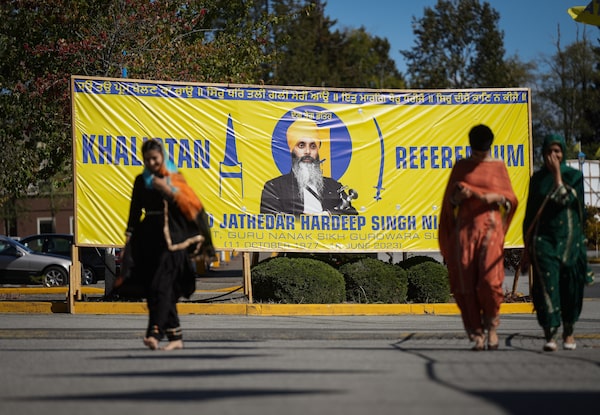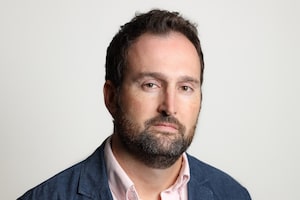
A photograph of late temple president Hardeep Singh Nijjar on a banner outside the Guru Nanak Sikh Gurdwara, in Surrey, B.C., on Sept. 18, 2023.DARRYL DYCK/The Canadian Press
India’s High Commissioner to Canada is maintaining that his country is not co-operating with the RCMP’s investigation into the murder of a Sikh separatist leader in B.C., despite contentions from a federal official that India is aiding the probe.
In a recent interview, Sanjay Kumar Verma told The Globe and Mail that India will not provide information to investigators until Canada shares evidence it has gathered into the slaying of Hardeep Singh Nijjar, who was gunned down in Vancouver on June 18, 2023.
Three months after the killing, Prime Minister Justin Trudeau stunned the House of Commons when he announced that there were credible allegations of a link between Mr. Nijjar’s assassination and agents of India.
Mr. Verma’s position differs from the one taken by Jody Thomas, Prime Minister Justin Trudeau’s then-national-security adviser. She told CTV in late January before her retirement that the relationship between the two countries was improving.
“I wouldn’t describe them as not co-operating. I think we’ve made advancements in that relationship,” Ms. Thomas said.
In November, an unsealed U.S. indictment supported the contention that India was plotting to kill multiple Sikh separatists in North America. It said a video of Mr. Nijjar’s bloodied body was sent to a man hired to kill New York-based lawyer and activist Gurpatwant Singh Pannun, organizer of a global referendum for an independent Khalistan in the Punjab region of India.
In interviews with The Globe both in November and in the past week, Mr. Verma said Canada has not shown India anything that ties Mr. Nijjar’s slaying to his country, which he says is a condition of New Delhi’s co-operation.
“We need relevant and specific evidence for us to help the Canadian authorities,” he said a week ago. “Unless we see something relevant and specific, it would be extremely difficult for us to do anything to help the Canadian authorities.”
Ottawa has said it shared credible allegations with Indian Prime Minister Narendra Modi’s government. Canada and its allies, including the United States and Britain, have urged India to co-operate.
Mr. Verma also said his office has not had a formal request from Ottawa to co-operate with the RCMP probe into Mr. Nijjar’s shooting. The RCMP declined to comment when asked if India has been formally approached to co-operate with the Nijjar investigation.
There have been no charges laid in the shooting of Mr. Nijjar, 45, who was killed in his car outside his temple in Surrey, B.C. The High Commissioner said the indictment from American prosecutors that links the murder of Mr. Nijjar to the plot to kill Mr. Pannun is based on “allegations” and “hearsay.”
India has called an inquiry committee to probe the evidence presented in the U.S. indictment, however, and its Ministry of External Affairs has vowed to take action on its findings.
But Mr. Verma warned that anyone advocating for an independent Khalistan remains a threat to India’s unity and national security, and should be treated as such.
“If anyone challenges the territorial integrity of India, there will be consequences,” he said.
Both Mr. Nijjar and Mr. Pannun are classified as “terrorists” under Indian law. In 2019, legislation was passed that made it possible for the government to designate individuals as terrorists without any formal judicial process. Critics of the amended Unlawful Activities (Prevention) Act, including United Nations special rapporteurs, argue that its definition of terrorism is too broad, and open to abuse by police.
According to New York-based advocacy group Human Rights Watch, India has misused this new counterterrorism law to silence journalists, human-rights defenders, activists and other critics of the government. Hartosh Bal, a Delhi-based journalist, said the Indian government’s narrative around Khalistan needs to be seen through this political lens.
“In India, the distance between dissent and disagreement with the government, and the use of laws like this, is very little,” said Mr. Bal, political editor of India’s The Caravan magazine. “The government has often used these laws against people who should only be counted as critics or calling for different political formations.”
Portraying the Khalistan movement as a bigger threat to Indian security than it really is also plays well politically, he said, and elements of Mr. Modi’s ruling Bharatiya Janata Party have openly celebrated the allegation that India is trying to silence Sikh separatists around the world. India’s Minister of External Affairs, Subrahmanyam Jaishankar, has even floated the notion that Canada is the “next Pakistan” and that India’s security interests extend far beyond its borders.
“There is this context of ‘Look, what a strong man, what a strong government. It can go into other countries and exterminate threats to India,’ ” Mr. Bal said.
There’s important historical context, too. Many Indians believe Canada failed to bring justice to victims of the Air India bombing in 1985, he added, and the sense that Canada is a safe haven for people accused of terrorism is playing into the current tension between the two countries. A 2010 inquiry report by former Supreme Court justice John Major concluded that the bombing was carried out by Sikh extremists.
“It makes it easier for Indians to talk about Canada as … not serious about issues of terrorism or violence,” Mr. Bal said.
Joly urges talks after India reportedly orders dozens of Canadian diplomats to leave
The High Commissioner declined to share evidence of Mr. Nijjar’s link to terrorism. But as a leader of the Khalistan Tiger Force, a group whose origins stem from the militant Babbar Khalsa International organization, Mr. Nijjar was involved in supporting what India considers a terrorist entity, he said. However, Public Safety Canada does not classify the Khalistan Tiger Force as a terror group.
India’s case against Mr. Nijjar, and other Khalistani separatists, was shared with the federal government in 2018. But the High Commissioner acknowledged Canada doesn’t agree that those allegations “meet the threshold” for legal evidence.
He also said Canada’s Sikh temples, called gurdwaras, are being used for “illegal purposes,” most notably inciting hatred against Hindus, but said authorities here have taken no action. Last fall, Mr. Verma was among Indian diplomats featured on a billboard outside Mr. Nijjar’s gurdwara, as followers called for justice in the killing.
Sikh activists often complain that India uses the travel visa process as a way to punish those in the Indian diaspora who publicly support Khalistan. Mr. Verma said visas remain a sovereign jurisdiction, and that India has the right to refuse them to anyone whom it perceives to be a threat to national security.
Mr. Verma acknowledged that Canadians may not agree with India’s interpretation of what constitutes terrorism. But they should be concerned that there are a “minority” of Sikhs living here who are trying to split up his country, he said.
“They should not allow their soil to be used by terrorists. They may be Canadian citizens, they may not, but they are terrorists who have an eye to dismembering a friendly country,” he said.
 Greg Mercer
Greg Mercer